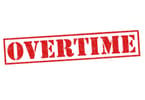In our earlier article [see Hotel guest records: Just how private are they? ETN (12/10/2014)] we discussed hotel privacy issues raised in Patel v. City of Los Angeles, 738 F. 3d 1058 (9th Cir. 2013 En Banc) which involved a constitutional challenge to Los Angeles Municipal Code Section 41.49(3)(a) which provides, in part, that hotel guest records “shall be made available to any officer of the Los Angeles Police Department for inspection”, provided that “[w]henever possible, the inspection shall be conducted at a time and in a manner that minimizes any interference with the operation of the business”. A hotel operator’s failure to make his or her guest records available for police inspection is a misdemeanor punishable by up to six months in jail or a $1,000 fine”.
The U.S. Supreme Court in a 5 to 4 opinion, City of Los Angeles, California v. Patel, __S. Ct.__ (2014), affirmed finding “that Section 41.49(3) is facially unconstitutional because it fails to provide hotel operators with an opportunity for precompliance review”. In another words Los Angeles police officers wishing to examine a hotel register must obtain a proper search warrant first. In this article we shall examine some of the arguments raised in the majority opinion written by Justice Sotomayor and the dissenting opinion of Justice Scalia.
Travel Law Update
Ukraine Shootdown
In Pounian & Green, Legal Challenges Faced by Victims of Plane Shootdown Over Ukraine, newyorklawjournal.com (6/26/2015)it was noted that “This coming July 17 will mark the first anniversary of the shootdown of Malaysia Airlines Flight 17 over eastern Ukraine…But was the airline negligent for operating its aircraft over the eastern Ukraine during a time of known hostilities? Three days before the flight 17 disaster, a Ukrainian military transport at 21,000 feet was shot down by a surface-to-air missile over eastern Ukraine and there had been similar attacks on other Ukrainian government aircraft. Indeed, during the several weeks prior to the disaster, other airlines-including Asiana, China Airlines & Qantas-decided to change their flight routes to avoid overflying eastern Ukraine”. The airspace over eastern Ukraine, however, was officially closed only up to 32,000 feet and remained legally open to commercial jets like Flight 17 that were operating above that altitude…The question is therefore raised: If airspace remains open for flight according to the responsible government authorities, to what extent must airlines question that decision and take it upon themselves to assess the risk of possible military or terrorist activity?”
Airline Ancillary Revenue Up
In Airline ancillary revenue raking in the big bucks, www.eturbonews.com (7/13/2015) it was noted that “Airline ancillary revenue has continued to grow for the eighth consecutive year…Airlines tracked…reported substantial increases in revenue gained from retail activities and the sale of a la carte services and frequent flier miles. Ancillary revenue per passenger among the 63 airlines (surveyed) is $17.49, which is 8.5 percent more than the 2013 result…The top ten carriers achieved an increase of nearly $4.6 billion in a single year, which represents revenue growth in excess of 22.5 percent”.
Share Economy At Crossroads
In Ruiz, Share Economy On Edge Over Worker Status, law.com (7/11/2015) it was noted that “The sharing economy is at a crossroads. In the face of litigation and political pressure, many companies built on a labor force of independent contractors are considering whether to reclassify their workers as traditional employees, say lawyers advising Silicon Valley startups…That means young companies face a hard decision, said Silicon Legal Strategy partner (Mr. X). They don’t want to be hit with a lawsuit, but at the same times, creating an employee base means absorbing the costs of Social Security, Medicare and unemployment taxes, expenses and workers’ compensation”.
Uber Fined $7.3 Million
In Miller, Uber Fined $7.3 Million for Reporting Lapses, therecorder.com (7/15/2015) it was noted that “A state regulatory judge on Wednesday smacked Uber Technologies, Inc. Subsidiary Rasier-AC LLC with a $7.3 million fine for failing to report information, including safety-related incidents, as required under terms of its permit…In a 92-page decision (see Order Instituting Rulemaking on Regulations Relating to Passenger Carriers, Ridesharing, and New Online-Enabled Transportation Services, ALJ/POD-RIM/ar9 (7/15/2015), Administrative Law Judge Robert Mason III (of The Public Utilities Commission of the State of California) held Rasier in contempt for what he called Rasier’s trivial and tardy responses to requirement that it detail how it served disabled customers, the zip codes where drivers accepted and declined rides and the cause of ‘incidents’ tied to problems with drivers”.
Travel Law Article: The Patel Decision
Historical Background
The Patel Decision, involving the constitutionality of a 116-year old Los Angeles, California ordinance, has much to do with the perceived nature of hotels and their place in our society. The historical background of American hotels is discussed in Travel Law, Law Journal Press (2015) at Chapter 4.
In Levander & Guterl, Are Hotels Dangerous?, nyimes.com (7/2/2015) it is stated “According to the historian A.K. Sandoval-Strausz, the author of ‘Hotel: An American History’, hotelkeepers have long struggled to control and purify the experience of an overnight stay, a struggle that pitted them against a veritable horde of ‘adulterers, seducers and prostitutes’, ‘burglars and confidence men’ who gravitated to the hotel because of the anonymity and temporary cover it provides.
In the 1890s, the Pinkerton detective agency distributed ‘wanted’ posters at hotel front desks, to be placed on top of the handwritten ledger. The posters…helped hotelkeepers survey their clientele, ensuring that no criminals were in their rooms…As the 20th century opened and Americans grew ever more transient, hotels became a centerpiece for concern about vice crimes…The opportunity for crimes, perpetrated by or against the hotel guest, was not entirely illusory…The Los Angeles ordinance at issue in the Patel case, along with others like it around the country, came out of a nationwide anti-vice campaign, a campaign rooted in concern about seedier hotels, their rooms rentable by the hour available for quick hookups and hits.
“A hotel’s private rooms are not its only, or even its most, dangerous spaces. Since the 1820s and 30s, when grand hotels like the Astor House in New York, the National Hotel in Washington and the Tremont Hotel in Boston emerged on the urban scene, hotel lobbies have been the place of chance encounters and planned assignations, places where high-end prostitutes went trolling for affluent businessmen and identity theft in the form of pickpockets was rife”.
The Patel Majority Decision
The majority in the Patel decision stated, in part, “Turning to the merits of the particular claim before us we hold that Section 41.49(3) is facially unconstitutional because it fails to provide hotel operators with an opportunity for precompliance review…Here we assumed that the searches authorized by Section 41.49 serve a ‘special need’ other than conducting criminal investigations. They ensure compliance with the record-keeping requirement, which in turn deters criminals from operating on the hotels’ premises…A hotel owner who refuses to give an officer access to his or her registry can be arrested on the spot. The Court has held that business owners cannot reasonably be put to this kind of choice…Absent an opportunity for precompliance review, the ordinance creates an intolerable risk that searches authorized by it will exceed statutory limits, or be used as a pretext to harass hotel operators and their guests. Even if a hotel has been searched 10 times a day, every day, for three months, without any violation being found, the operator can only refuse to comply with an officer’s demand to turn over the registry at his or her own peril. To be clear, we hold only that a hotel owner must be afforded the opportunity to have a neutral descision-maker review an officer’s demand to search the registry before he or she faces penalties for failing to comply”.
The Scalia Dissent
Justice Scalia, writing for the dissent, stated “Los Angeles, like many jurisdictions across the country, has a law that requires motels, hotels and other places of overnight accommodations…to keep a register containing specified information about their guests…The purpose of this recordkeeping requirement is to deter criminal conduct, on the theory that criminals will be unwilling to carry on illicit activities in motel rooms if they must provide identifying information at check-in. Because this deterrent effect will only be accomplished if motels actually do require guests to provide the required information, the ordinance also authorizes police to conduct random spot checks of motels’ guest registers…The ordinance limits these spot checks to the four corners of the register and does not authorize police to enter any nonpublic area of the motel…
“The parties do not dispute the governmental interests at stake. Motels not only provide housing to vulnerable transient populations, they are also a particularly attractive site for criminal activity ranging from drug dealing and prostitution to human trafficking. Offering privacy and anonymity on the cheap, they have been employed as prisons for migrants smuggled across the border and held for ransom, see Sanchez, Immigrant Smugglers Become More Ruthless, Washington Post, June 28, 2004, p. A3…and rendezvous sites where child sex workers meet their clients on threat of violence from their procurers…Because I believe that such a limited inspection of a guest register is eminently reasonable under the circumstances presented, I dissent”.
The author, Justice Dickerson, has been writing about Travel Law for 39 years including his annually updated law books, Travel Law, Law Journal Press (2015) and Litigating International Torts in U.S. Courts, Thomson Reuters WestLaw (2015), and over 350 legal articles. For additional travel law news and developments, especially in the member states of the EU, see IFTTA.org.
This article may not be reproduced without the permission of Thomas A. Dickerson.





















